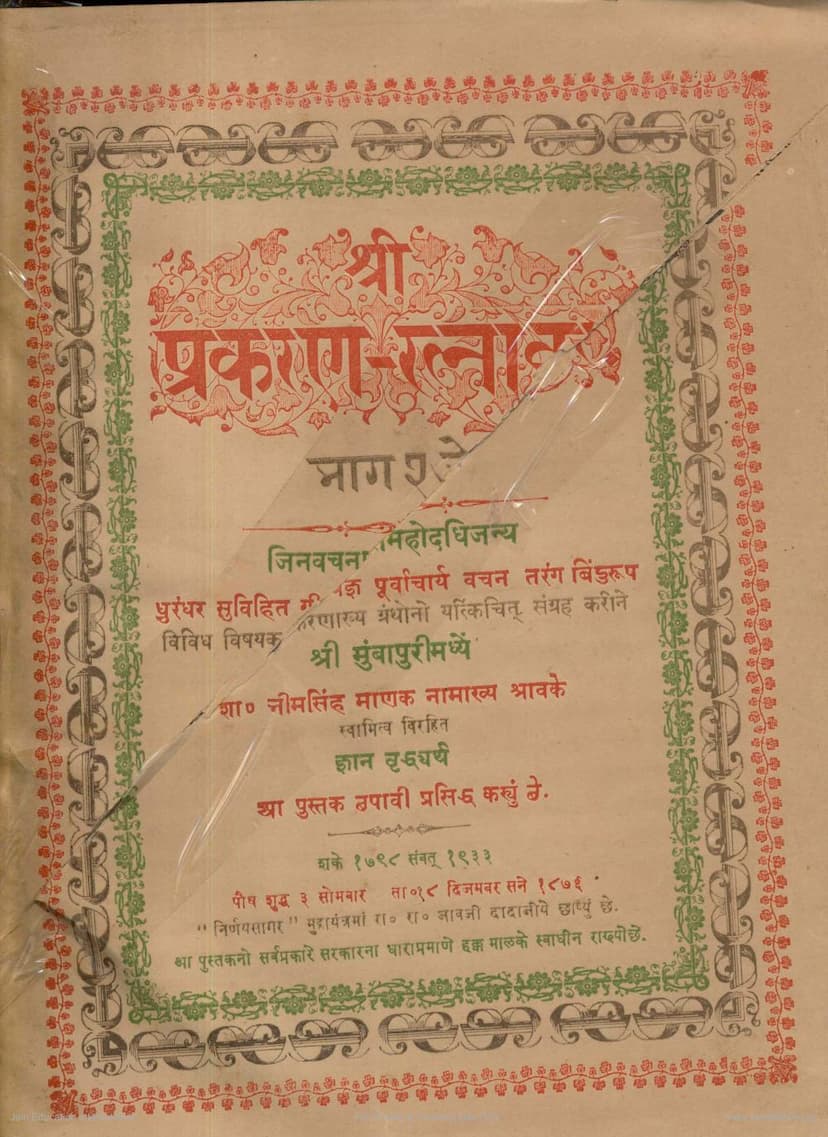Prakarana Ratnakar Part 2
Added to library: September 2, 2025

Summary
Here's a comprehensive summary of the provided Jain text, focusing on the key themes and arguments presented:
Book Title: Prakarana Ratnakar Part 2 Author(s): Bhimsinh Manek Shravak Mumbai Publisher: Shravak Bhimsinh Manek
Overall Purpose:
The text is a collection of Jain scriptures and treatises compiled and published by Shri Bhimsinh Manek Shravak from Mumbai. The preface highlights a concern for the decline of Jainism in the current era (Pancham Kal) and emphasizes the crucial need for propagating knowledge by reviving and re-publishing ancient Jain texts. The author believes that understanding these old scriptures is vital for the growth and preservation of the Jain faith, especially among the laity.
Key Themes and Arguments:
- Importance of Reviving Ancient Texts: The preface strongly advocates for the restoration and widespread dissemination of ancient Jain scriptures. The author expresses concern that many valuable texts are being lost over time due to neglect. He cites the example of Shri Haribhadra Suri's extensive works, many of which are no longer accessible, as a consequence of not undertaking their restoration.
2G. Role of Knowledge in Dharma Propagation: The text emphasizes that the growth of Dharma is directly linked to the expansion of knowledge. This expansion, in turn, depends on the availability and accessibility of scriptures, diligent study, curiosity, devotion to Dharma, perseverance, and effort.
-
Challenges of the Current Era: The author laments the significant decline in the number of Jain monks and nuns, placing the responsibility of maintaining the Dharma on the shoulders of the laity (Shravaks and Shravikas). This underscores the urgency to spread knowledge to this community.
-
Value of Studying Ancient Texts: Reviving ancient texts is seen as a way to understand the scholarly achievements of past luminaries, the devotional fervor of people in earlier times, and to contrast the decline in religious and intellectual pursuits from the past to the present. The original intent of great scholars in composing voluminous works was purely for the propagation of Dharma and knowledge, devoid of any personal gain.
-
The Power of Printed Media: The text acknowledges the advancements in technology, particularly the printing press ("mujayantra"), which makes the task of preserving and disseminating knowledge much easier than in the past when manuscripts were on perishable materials like palm leaves and paper (handwritten). The author stresses the need to utilize this technology for the cause of Jain knowledge.
-
The Need for Patronage: The author explicitly states that he lacks the financial capacity to undertake the publication of such a large book ("Prakaran Ratnakar") single-handedly. He appeals for the support and assistance of his fellow Jains ("swadharni bhraatyo").
-
Appreciation for Patrons: The text dedicates significant portions to expressing deep gratitude and admiration for the individuals and families who supported the publication. Notable patrons mentioned include:
- Shri Keshavji Nayak (the primary supporter) | Raja Bahadur Babusaheb Laxmipati Singhji Bakhtipatisinghji
- Munim Himgiri Sagarji and Sumatisagarji
- Shri Hanamansingh Narasingh, Shri Ghela Jethai, Shri Vardhman Punshi, Shri Noraj Desal from Mumbai
- Shri Dhanpati Singhji Bakhtipatisinghji from Ahmedabad
- Shri Parbat Ldha, Shri Mulji Devji, Shri Jadhavji Parbat, Shri Noraj Narpal, Shri Kikabhai Phoolchand, Shri Thackersey Devji from Mumbai
- Shri Dalpatbhai Mamanbhai and Shri Mayabhai Premanbhai from Ahmedabad
- Shri Sakalchand Dukchan from Sadavalavala
- Shri Anupchand Malukchand from Naruchwala
- Shri Kasturchand Singhji Parekh from Kalmut
- Maharaj Shri Mulchandji and Javer Sagarji (spiritual guides)
- Samvegi Muni Shri Yatmaramji and Muni Shri Nithivijayji Maharaj (monks)
- Acharya Shrimad Shri Viveksagar Suri and Jattadhari Shri Dharanendrasuri (spiritual leaders)
- Shri Hukamchand Maharaj
-
Acknowledgement of Errors and Request for Forgiveness: The author humbly acknowledges potential errors in the text due to oversight or printing mistakes ("matidosh athva drishtidosh"). He requests readers to forgive any shortcomings and to focus on the essence of the knowledge provided. He specifically mentions an error on page 731-756 where a text by Ratan Chand Sthanakvasi was included inadvertently, which he regrets and apologizes for, promising to adhere to his commitment of including only works by esteemed scholars in the future.
-
Invitation for Corrections: The author invites readers to point out any factual errors or discrepancies they find, so that corrections can be made in future editions to ensure the accuracy and integrity of the published work.
-
Content of the Compilation: The table of contents (Anukramanika) reveals that "Prakarana Ratnakar Part 2" is a substantial compilation containing a wide array of Jain texts, including:
- Various Stotras (hymns) dedicated to different Tirthankaras (Shri Rishabhdev, Shri Ajitnath, Shri Sambhavnath, Shri Abhinandanath, Shri Sumatinath, Shri Pushpadant, Shri Shitalnath, Shri Shreyanshnath, Shri Vasupujya, Shri Vimalnath, Shri Anantnath, Shri Dharmanath, Shri Shantnath, Shri Kunthunath, Shri Aranath, Shri Mallinath, Shri Munisuvratnath, Shri Naminath, Shri Neminath, Shri Parshvanath, Shri Mahavir, Shri Gautam, Shri Vardhaman, Shri Chakrayudha, Shri Vrishabhanubhava, and Shri Parshva Pratihariya).
- Spiritual discourses and philosophical treatises like "Adhyatmkalpadrum" (covering topics like equanimity, detachment from worldly attachments, etc.), "Samkya Sarvasva," and "Shastragun Adhikara."
- Discussions on different aspects of Jain philosophy, ethics, and practice, such as the nature of soul, karma, liberation, and the path to attain it.
- The text also includes collections of verses and works by various respected Jain Acharyas.
In essence, "Prakarana Ratnakar Part 2" is a monumental effort to preserve and propagate Jain wisdom. It reflects the author's deep commitment to the faith and his belief in the power of accessible knowledge to sustain and revitalize Jainism for future generations. The detailed table of contents showcases the breadth and depth of the collected works, covering devotional hymns, philosophical discussions, and ethical guidelines.